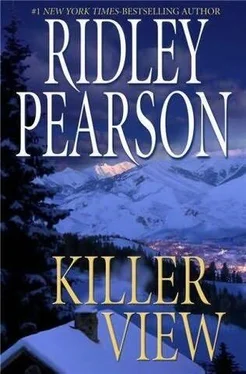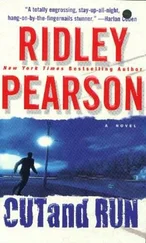He disappeared now into the woods, his mission twofold: to track the man who had kidnapped Mark Aker, for there was only one set of snowshoe tracks coming and going, and to make certain no one tracked him.
Brandon ’s ramblings crackled on in his earpiece, as his deputy descended from Aker’s cabin toward the Cherokee. The reception wasn’t great, but he continued to hear Brandon ’s voice, which was all that mattered.
The snowpack was thinner inside the woods, most of it caught by branches. He doubled back on his own tracks, removed the snowshoes, and climbed rocks to break his own trail from being followed. He climbed trees for surveillance and never left the confines of the forest, even when the tracks he was following reached across acres of snowfield. He located and climbed two trees that had clearly been used to scout the cabin; they’d been climbed by a strong man with a good-sized leg spread-a man with coarse black hair, judging by the strands he found stuck to the pine sap. At the top of one of the trees, he found a rubbed spot on a stout branch that suggested an object had been braced there-a rifle or monocular-the location offering an unobstructed view of the cabin’s porch.
Brandon had not been shot from such an elevation, but the dart on the floor of the cabin lingered in Walt’s mind.
What was Mark involved in? Why would anyone want, first, to try to kill and then, later, kidnap a local veterinarian? If he’d been willing to shoot Brandon, why not Mark Aker? Why the dart?
Being up a tree helped with radio reception. Brandon had reached the vehicle and felt able to drive himself into Challis. They signed off, with Brandon promising Walt a snowmobile on Yankee Fork Road in short time.
Walt returned to the snowfield and stayed parallel to the tracks. Jeff Longfeather had taught him about time and patience; where possible, he stole into the center of the well-traveled elk trail and reestablished the snowshoe tracks-the man was pulling a heavy sled. Mark? He’d clearly made good time, establishing himself in Walt’s mind as big and strong. He was also an expert with a sniper rifle, keeping Walt mindful of his cover.
An hour and a half passed before his radio barked again. The Challis sheriff and a deputy were waiting nearby on Yankee Fork Road.
Walt discovered some cigarette ash, dancing on the snow. The butt had been GI’d, or packed out, leaving only the rolling worms of ash as evidence. The man towing Mark had paused here, had come back to the sled and done something-had administered more drugs, maybe, or delivered a warning. Walt followed the tracks and soon met up with two men on snowmobiles. They wore sheriff patches.
A track of a snowmobile towing a sled was evident. It headed not toward Challis, as he’d expected, but deep into the National Forest.
Introductions were made. Steam poured from Walt’s clothing. The two eyed him apprehensively; he sensed reluctance in them that he didn’t understand.
Riding a snowmobile would chill him down quickly, so he took a moment to strip down to his bare chest and change into a fresh Capilene undershirt. He redressed in his uniform shirt and zipped up his jacket, shifting on his feet to get his body heat back. The conversation never stopped as he caught up the Challis sheriff, a man with whom he’d had a major falling-out over the killing of a wolf a year earlier. There was no love lost between them, and he thought that that explained their mutual reluctance.
The Challis sheriff established that they’d crossed no fresh snowmobile tracks. “This guy’s headed back the way he came.”
“But what’s out there?” Walt inquired.
“Not much. Not for a long ways, anyway,” said the sheriff.
“Sunbeam or Clayton, I suppose,” the deputy said with a bit of a twang. His face barely showed out of the tightened hood and ski goggles. “Nothing else between here and there but a shitload of snow.”
“And your odd summer ranch on grandfathered parcels,” the sheriff added. “Would be a hell of a lot faster to head back to town and drive down to Clayton than punching through on Yankee Fork Road.”
“But the only sure way to know where he’s going is to follow the snowmobile track,” Walt said.
“Can’t argue with that,” the sheriff said. “I’m just saying there ain’t many places a fella can meet up with Highway Seventy-five, and Clayton’s the most likely of ’em.”
“But not the only one,” Walt said.
“I think we established that,” the sheriff said indignantly.
“You mind if I borrow one of your machines?” Walt asked. “I’ll follow on the trail while you get your guys down to Clayton. It wouldn’t hurt to roadblock Seventy-five at the turn to May.”
“Radios won’t do shit in there. You’ve got maybe a mile of coverage. Nothing more.”
Walt tapped his pack. “Satellite phone,” he said, raising a snarl in his counterpart. The Challis sheriff’s office wasn’t at the forefront of technology. “My deputy has the number.”
“You sure you want to do Yankee Fork Road?” the deputy asked one final time. “There ain’t nothing out there for thirty miles, Sheriff.”
Walt saw red. He didn’t like his decisions being questioned. He’d had that a lot over the past six months. People had expected him to fire Tommy Brandon. Myra had expected him to dump Gail’s clothes out the front door.
Minutes later, he found himself riding the snowmobile at forty miles an hour, following in the tread impressions that played out before him. It wasn’t until he caught a glimpse of himself in the snowmobile’s vibrating rearview mirror that he understood the reluctance he’d seen on their faces: mucus from his nose had frozen in twin lines on his upper lip; his eyebrows were white with frost, as were his eyelashes and some hairs on his neck and lower ears; his cheeks were an unnatural red, and some drool was frozen to his chin. He looked like a wild mountain man.
He rubbed his face clean with his glove. You couldn’t tow a sled at the speed he was going, which meant he was making up time. But he was riding fast, and often blind, into the path of a sniper who wasn’t shy about shooting cops.
He began slowing down at every curve and wishing the snowmobile didn’t whine like a chain saw, announcing his approach.
INSPIRED BY THE PANORAMIC VIEW OF PRISTINE WILDERNESS, the soundtrack from The Sound of Music played in his head-no narration, just the gentle strains of Julie Andrews’s bell-like voice.
He took something of a risk in leaving the vet down there in the sled, as he climbed a mountain ridge overlooking a long bend in Yankee Fork Road. Strong winds had blown away the snow, leaving scrabble rock and patches of ice, which he negotiated with care.
The ascent is carried out with precision, the timing critical, as he leaves his captive bound and unconscious far below. To make even the slightest mistake now can cost him everything, and so he goes about his mission with great care.
He loved grenades. It was well worth the climb to achieve the godlike sense of power associated with kicking an avalanche. He carried the CheyTac, as a measure of precaution: he could shoot the eye out of an eagle at half a mile with the thing. But it was the two grenades that really warmed his nut sack.
He stopped several times to catch his breath in the thin air. Looked down at the snowmobile and sled, a quarter mile beyond the turn. No one was going to come down this road, unless they were after him, but, if anyone did, he’d covered the unconscious vet with a blanket to hide the sled’s contents.
People had seriously misjudged the man. They took him for a hick and an incompetent. But in doing so they had allowed him to overhear the girl’s interrogation. They had given him a way out of this mess. The doctor was the witnesshe’d longed for. A simple double cross and his mission-his message-was saved.
Читать дальше












